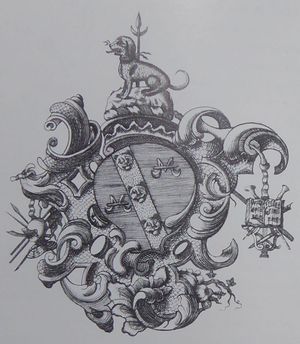Difference between revisions of "William Hunt 1697-1753"
(Created page with "__NOTITLE__ ===name::William name::HUNT date of birth::1697-date of death::1753=== ====Biographical Note==== Son of family::Thomas Hunt of location::Wes...") |
|||
| Line 1: | Line 1: | ||
__NOTITLE__ | __NOTITLE__ | ||
===[[name::William]] [[name::HUNT]] [[date of birth::1697]]-[[date of death::1753]]=== | ===[[name::William]] [[name::HUNT]] [[date of birth::1697]]-[[date of death::1753]]=== | ||
| − | + | [[file:P1200941(1).JPG|thumb|One of Hunt's bookplates (British Museum Franks Collection 15752)]] | |
====Biographical Note==== | ====Biographical Note==== | ||
Son of [[family::Thomas Hunt]] of [[location::West Lavington, Wiltshire]], a member of a long-established family there in "the comfortable circumstances of the middle ranks of the country gentry" (Crittall). Matriculated at [[education::Trinity College, Oxford]] 1714, but did not graduate; in 1716 he was admitted at the [[organisations::Middle Temple]]. In 1715 he inherited property and estates from his uncle [[family::William Grubbe]], adding to his prosperity. The rest of his life seems to have been spent largely as a country gentleman, playing various roles in local administration; he was a [[occupation::JP]] from 1744, having earlier been made a [[occupation::major]] in the Army, and a [[occupation::commissioner]] for land tax, and army recruiting. His activities as a magistrate are recorded in detail in the notebook he kept 1742-49, which has been transcribed and edited. | Son of [[family::Thomas Hunt]] of [[location::West Lavington, Wiltshire]], a member of a long-established family there in "the comfortable circumstances of the middle ranks of the country gentry" (Crittall). Matriculated at [[education::Trinity College, Oxford]] 1714, but did not graduate; in 1716 he was admitted at the [[organisations::Middle Temple]]. In 1715 he inherited property and estates from his uncle [[family::William Grubbe]], adding to his prosperity. The rest of his life seems to have been spent largely as a country gentleman, playing various roles in local administration; he was a [[occupation::JP]] from 1744, having earlier been made a [[occupation::major]] in the Army, and a [[occupation::commissioner]] for land tax, and army recruiting. His activities as a magistrate are recorded in detail in the notebook he kept 1742-49, which has been transcribed and edited. | ||
====Books==== | ====Books==== | ||
| − | Hunt inherited books from his uncle and continued to develop a library of his own; his account book for 1726-42 (Wiltshire Record Office 1553/69) includes references to book purchases. He used two engraved armorial bookplates ( | + | Hunt inherited books from his uncle and continued to develop a library of his own; his account book for 1726-42 (Wiltshire Record Office 1553/69) includes references to book purchases. He used two engraved armorial bookplates (Franks 15751-2), incorporating both the musical and military interests which were part of his life. His will has no specific mention of books; they would have been part of his "household goods and furniture" left in trust for his only son [[family::Thomas Hunt 1736-72|Thomas Hunt]] (1736-72). |
====Sources==== | ====Sources==== | ||
<div id="sourcelist"> | <div id="sourcelist"> | ||
*[http://discovery.nationalarchives.gov.uk/details/r/D539618 Will of William Hunt, The National Archives PROB 11/802/329]. | *[http://discovery.nationalarchives.gov.uk/details/r/D539618 Will of William Hunt, The National Archives PROB 11/802/329]. | ||
| − | *[http://www.wiltshirerecordsociety.org.uk/pdfs/wrs_v37.pdf Crittall, E., ''The justicing notebook of William Hunt'', Wiltshire | + | *[http://www.wiltshirerecordsociety.org.uk/pdfs/wrs_v37.pdf Crittall, E., ''The justicing notebook of William Hunt'', Wiltshire Record Society, Devizes, 1982]. |
*Gambier Howe, E. R. J. ''Franks bequest: catalogue of British and American book plates bequeathed to the ... British Museum''. London, 1903. | *Gambier Howe, E. R. J. ''Franks bequest: catalogue of British and American book plates bequeathed to the ... British Museum''. London, 1903. | ||
*Latcham, P., ''Bookplates in the Trophy style'', London, 2006, p.32. | *Latcham, P., ''Bookplates in the Trophy style'', London, 2006, p.32. | ||
Revision as of 00:32, 8 January 2021
William HUNT 1697-1753
Biographical Note
Son of Thomas Hunt of West Lavington, Wiltshire, a member of a long-established family there in "the comfortable circumstances of the middle ranks of the country gentry" (Crittall). Matriculated at Trinity College, Oxford 1714, but did not graduate; in 1716 he was admitted at the Middle Temple. In 1715 he inherited property and estates from his uncle William Grubbe, adding to his prosperity. The rest of his life seems to have been spent largely as a country gentleman, playing various roles in local administration; he was a JP from 1744, having earlier been made a major in the Army, and a commissioner for land tax, and army recruiting. His activities as a magistrate are recorded in detail in the notebook he kept 1742-49, which has been transcribed and edited.
Books
Hunt inherited books from his uncle and continued to develop a library of his own; his account book for 1726-42 (Wiltshire Record Office 1553/69) includes references to book purchases. He used two engraved armorial bookplates (Franks 15751-2), incorporating both the musical and military interests which were part of his life. His will has no specific mention of books; they would have been part of his "household goods and furniture" left in trust for his only son Thomas Hunt (1736-72).
Sources
- Will of William Hunt, The National Archives PROB 11/802/329.
- Crittall, E., The justicing notebook of William Hunt, Wiltshire Record Society, Devizes, 1982.
- Gambier Howe, E. R. J. Franks bequest: catalogue of British and American book plates bequeathed to the ... British Museum. London, 1903.
- Latcham, P., Bookplates in the Trophy style, London, 2006, p.32.
